Getting started
The recommended starting dose is two 100-mg capsules, which are taken twice per day—with or without food.

Remember
- VONJO capsules should be swallowed whole, not chewed, opened, or broken
- You should take VONJO at the same time every day
- Do not change your dose or stop taking VONJO without talking with your doctor
Do not use VONJO if you are taking other medications that are strong CYP3A4 inhibitors or inducers. Be sure to tell your doctor about any medications you are taking.

Following your doctor’s prescription from the start is an important part of your VONJO daily treatment plan. Everyone reacts differently to their treatment, and your doctor will monitor your response to VONJO.

If you miss a dose of VONJO, skip the dose and just take your next dose at your regularly scheduled time. Do not take 2 doses at the same time to make up for the missed dose.

If you take another medicine for your myelofibrosis, be sure to follow your doctor’s instructions on how to slowly decrease (taper) your dose or stop taking it before you begin taking VONJO.
There are possible side effects you may need to watch for when taking VONJO
You can learn about the most common side effects that people taking VONJO experienced in the Important Safety Information below or in a clinical study here. Most people taking VONJO were generally able to tolerate side effects they experienced and did not stop taking VONJO due to side effects during the clinical study.
What to do if you experience diarrhea
If you notice any change in how often you have bowel movements, if they become softer or you have diarrhea, start taking an antidiarrheal medicine (for example, loperamide) as soon as you notice changes, as directed by your healthcare provider. Get emergency medical help right away if your diarrhea becomes severe.
It’s very important to talk to your doctor if you develop diarrhea during treatment with VONJO
Tell your doctor right away if you:
- Experience unusual bleeding, bruising, and fever
- Feel dizzy, lightheaded, or faint
- Notice any signs or symptoms of a blood clot—these include swelling, pain, or tenderness in one or both legs; sudden and unexplained chest pain; or shortness of breath or difficulty breathing
- Develop signs and symptoms of an infection—these include chills, nausea, vomiting, aches, weakness, fever, painful skin rash, or blisters
Get emergency help right away if you have any symptoms of a heart attack or stroke while taking VONJO, including:
- Discomfort in the center of your chest that lasts for more than a few minutes or that goes away and comes back
- Severe tightness, pain, pressure, or heaviness in your chest, throat, neck, or jaw
- Pain or discomfort in your arms, back, neck, jaw, or stomach
- Shortness of breath with or without chest discomfort
- Breaking out in a cold sweat
- Nausea or vomiting
- Lightheadedness
- Weakness in one part or on one side of your body
- Slurred speech
These are not all the side effects that could happen with VONJO. Please see the Important Safety Information below. Call your doctor if you have any questions or concerns.
Before you start taking VONJO, here’s what you need to know
Your doctor will run some tests before and during treatment with VONJO.
A complete blood count (CBC) helps track how you’re responding to treatment and if there are changes in your blood cell counts.
Coagulation testing will see how your blood is clotting and check your risk of bleeding before you start taking VONJO.
A baseline electrocardiogram (ECG) will check how your heart is working.
Don’t forget to tell your doctor about all the medicines you take, including prescription and over-the-counter medicines, vitamins, and herbal supplements and remedies. Taking VONJO with certain other medicines may affect the amount of VONJO or the other medicines in your blood and may increase your risk of side effects or affect how well VONJO works.
Especially tell your doctor if you take hormonal contraceptives (birth control). Hormonal birth control methods, except for intrauterine systems containing levonorgestrel, may not work during treatment with VONJO and for 30 days after your last dose. Talk to your healthcare provider about birth control methods that may be right for you during treatment with VONJO.
You should also tell your doctor about all your medical conditions, including if you:
- Have active bleeding, have had severe bleeding, or plan to have surgery or noninvasive procedures. You should stop taking VONJO 7 days before any planned surgery or invasive procedures
- Have diarrhea or commonly have loose stools
- Have had a blood clot, heart attack, other heart problems, or stroke
- Have a history of low blood levels of potassium. It is important that you get blood tests done during treatment with VONJO to monitor your body salts (electrolytes)
- Smoke or were a smoker in the past
- Have had any other cancers
- Have an infection
- Have nausea or vomiting
- Have liver or kidney problems
- Are pregnant or plan to become pregnant. It is not known if VONJO will harm your unborn baby
- Are breastfeeding or plan to breastfeed. It is not known if VONJO passes into your breast milk. You should not breastfeed during treatment and for 2 weeks after your last dose of VONJO. Talk to your healthcare provider about the best way to feed your baby during this time
- Plan to father a child—VONJO may affect fertility in males

